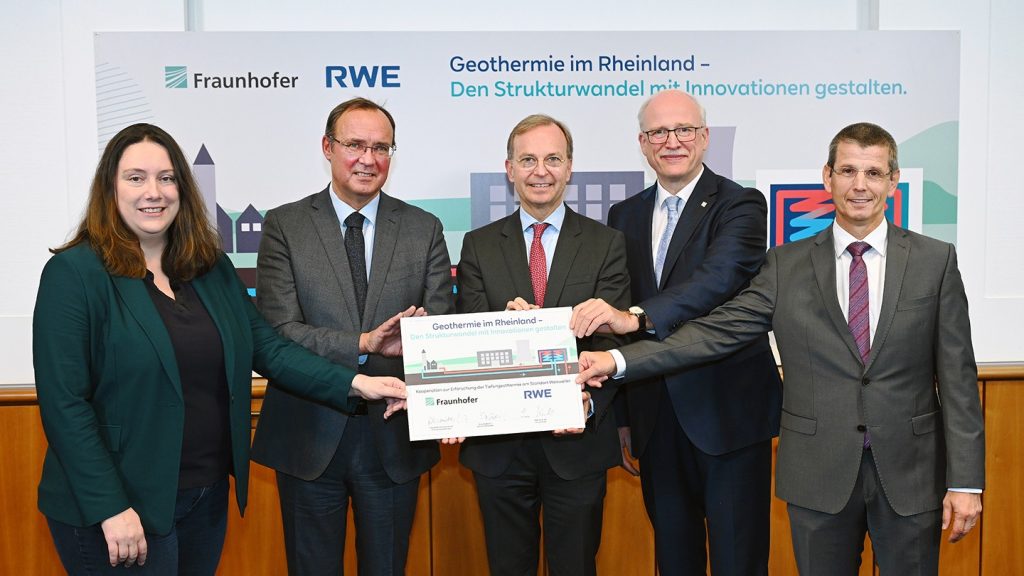Fraunhofer IEG and RWE join forces on exploring geothermal potential

Fraunhofer IEG and RWE are joining forces on exploring geothermal as option for heating as part of a research plant and geo observatory in Weisweiler, Germany.
Fraunhofer IEG (Energieinfrastrukturen und Geothermie) and power utility RWE have signed a cooperation agreement on the development of technical and economical development of geothermal energy. As part of the agreement – among other aspects – both partners want to bring heat generation from the depths to operational readiness in a research power plant. The subsoil at the RWE site in Weisweiler is to be gradually explored for the potential of this renewable energy. In addition, a geological observatory is to be set up. Fraunhofer is opening a research site for geo-resources above ground and building a technical center for geothermal conversion technologies. Fraunhofer and RWE Power have now signed the relevant cooperation agreement in the presence of the Executive Parliamentary State Secretary in the Federal Ministry of Education and Research, Thomas Rachel.
For the Fraunhofer Society for the Promotion of Applied Research, board member Prof. Dr. Alexander Kurz signed the agreement for the Fraunhofer Institute for Energy Infrastructures and Geothermal Energy (IEG), which will soon also be located in Weisweiler, whose head, Prof. Dr. Rolf Bracke. Board member Dr. Lars Kulik the cooperation agreement.
Rheinisches Revier is a preferred region for deep geothermal energy
The two partners want to jointly develop sustainable energy at the traditional power plant location. The Rhenish Revier is a preferred region for deep geothermal energy, prominently manifested in the Aachen thermal springs. Further rock layers with large amounts of hot thermal water are expected in the subsurface; namely the mass limestone and reef limestone of the Devonian and Lower Carboniferous, i.e. limestone around 350 million years old.
Research topics at the site should be all aspects of geothermal system technology: from high-temperature borehole pumps to marketable processes for generating electricity, heating and cooling to operating strategies. In addition, processes for material and heat storage are being developed.
1,500 meter deep exploratory drilling
In addition to the construction of the technical center on the site provided by RWE, the next concrete step will be an exploratory borehole up to 1,500 meters deep next year, which the partners will sink as part of the EU project DGE-ROLLOUT, as it is called in the technical language ; DGE stands for Deep Geothermal Energy. Together with the geophysical surface station, the borehole forms the observatory for monitoring the subsurface.
Geothermal energy is renewable energy
In steps that are still to be planned, a detailed, three-dimensional, scientific survey of the subsurface and, based on this, a deep borehole of up to 4,000 meters in length is aimed for, which, if successful, will produce warm thermal water. The advantages of geothermal energy are its sustainability, regionality, base load capacity and low land consumption.
“With the newly founded Fraunhofer Institute for Energy Infrastructures and Geothermal Energy, two very central key tasks of our time are linked: climate protection and successful structural change. The Rheinische Revier is already strong as an energy and research location. With the cooperation between RWE and Fraunhofer IEG, the existing competence is used and the tradition continued, ”emphasized Thomas Rachel, Parliamentary State Secretary in the Federal Ministry of Education and Research, on the occasion of the signing of the contract.
“Geothermal energy has great potential to play a central role in the heat supply of the future. With the Fraunhofer IEG at the Weisweiler location, we are doing excellent research in this field. Thanks to the cooperation with RWE, we are making important contributions to the energy transition and the achievement of the national climate protection goals, and we are providing impetus for structural change in the Rheinische Revier, ” explained Fraunhofer board member Dr. Alexander Kurz in Weisweiler.
“Over 50 percent of the energy converted in Germany is used as heat in households and industry. To protect the climate, we have to generate heat in just a few years without the fossil fuels coal, natural gas and oil. Geothermal energy and modern heating networks can develop a climate-neutral energy source here in the long term, which is based on regional know-how and thus bridges the gap from coal mining to thermal mining. The real laboratory in Weisweiler serves both geologically and in terms of energy management as a pilot location for the entire north-western European region, ” said Dr. Rolf Bracke, Director of Fraunhofer IEG explained the scope of the research project.
“As an open-cast mining community, Eschweiler is in the midst of structural change. As a strong business location, we are pleased about the commitment of the Fraunhofer Institute and RWE in Weisweiler. We work hand in hand together so that we succeed in the structural change and the transformation of jobs,” said Eschweiler’s mayor Nadine Leonhardt.
“District heating from thermal water – this is a technologically new component of the energy transition for our region. Our traditional energy location Weisweiler meets all the requirements to implement this innovative project,” said RWE Power board member Dr. Lars Kulik. “District heating lines run from the Weisweiler location to Aachen. If one day regeneratively generated district heating flows through it, that is another tangible contribution from RWE to regional structural change. “
Infrastructure is already on site
With the Aachen-Weisweiler district heating network, the infrastructure for heat supply is already in place on site: it is already supplying district heating from the Weisweiler lignite power station to the Aachen area, among other places. However, due to the phase-out of coal, the heat source lignite must be replaced by other energy sources in the medium term; deep geothermal energy could be an option. The project idea for the technical center has already been awarded the 3rd star as part of the immediate Plus program of the future region Rheinisches Revier. Further measures are in the application phase with state donors.
Source: Fraunhofer IEG